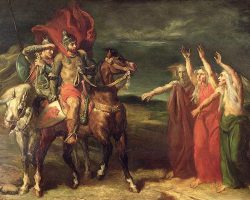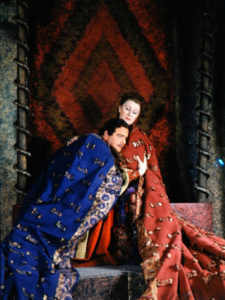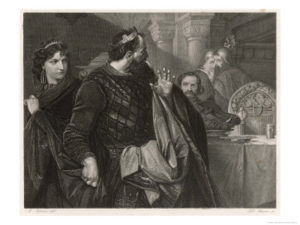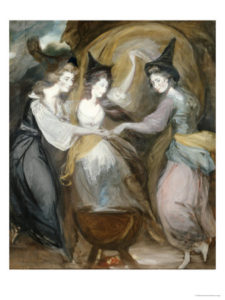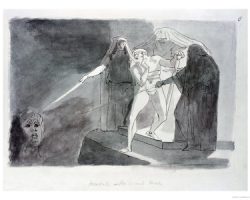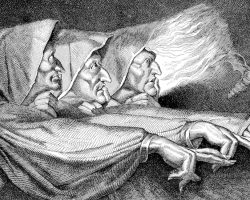
Shakespeare’s Macbeth – A Scene By Scene Synopsis (Act 5)
Macbeth Synopsis – Act 5 Scene 1
In troubled Scotland, at Dunsinane Castle, Lady Macbeth is on the brink of destruction. She has been left alone, Macbeth being out in the field preparing his army. Her lady-in-waiting is anxious. Lady Macbeth has been walking and, worse, talking in her sleep. The loyal gentlewoman calls in the doctor to diagnose her illness, but she refuses to tell him what Lady Macbeth revealed. The doctor learns soon enough. Lady Macbeth passes them in a blind trance, rubbing her hands frantically as if to wash them. In her anguished dream there, is a spot that will not come out, no matter how hard she scrubs. She speaks brokenly, veering from one memory to another. The chain of bloody events is mixed up, she tries to was her hands of Duncan’s blood, and then scolds Macbeth for hesitating to kill him, she asks where Lady Macduff is, warns Macbeth to control himself at the haunted banquet, tells him to wash his hands and put on his nightgown, and begs him to forget his fears of Banquo’s ghost. At last she hears knocking – the knocking at the porter’s gate before the dead king is discovered – ad she takes the imaginary hand of Macbeth, to lead him to bed, to sleep and oblivion. The doctor, having learned the cause of Lady Macbeth’s secret agony, is horrified, and not a little afraid. It is dangerous to have such knowledge. He cannot treat her: she needs a doctor of the soul, not of the body.
Macbeth Synopsis – Act 5 Scene 2
In the country outside the castle, armies are mobilizing for war. The thanes Angus and Lenox, together with other Scottish nobles, have switched sides, and are about to march with their soldiers to join their English allies near Birnam Wood. The entire country is rising against Macbeth. The king has withdrawn to Dunsinane Castle, which he is fortifying against siege
Macbeth Synopsis – Act 5 Scene 3
Inside the castle, Macbeth forbids any more reports of the armies massing against him. He still believes in his charmed life. A servant, pale with fear, braves Macbeth’s anger to tell him of the ten thousand strong English force. The news makes Macbeth uneasy. As he turns the threat over in his mind, he becomes more of the poetic, reflective man of old, rather than the brutal, emotionless tyrant of late. Sad, he muses that he has lived long enough. He would have to endure the winter of old age without the things that would make it less harsh: honour, love, obedience and friends. He has sacrificed all that, Macbeth pulls himself together, and calls his loyal armour bearer, Seyton. He seeks relief in action, giving orders, donning his armour. He is ready to be the warrior again. He spares a moment to ask the doctor about his wife. Told that her sickness lies only in her soul, Macbeth asks the doctor if he cannot cure her of her sorrows. The doctor replies that the patient must minister to ‘himself’ Macbeth turns to more pressing problems. He strides off, defiant, sure that he will be safe till Birnam Wood comes to Dunsinane.
Macbeth Synopsis – Act 5 Scene 4
Meanwhile, at Birnam Wood, the English and Scottish armies have met. Malcolm orders the soldiers to camouflage themselves with boughs cut from the trees. The commanders, Malcolm, Macduff and Siward prepare for the advance on Dunsinane Castle.
Macbeth Synopsis – Act 5 Scene 5
Back at Dunsinane, Macbeth believes that his position is impregnable: the castle is strong enough to withstand a siege. Suddenly, women are heard crying in the heart of the castle. While Seyton investigates, Macbeth reflects on how he has lost the capacity to feel fear. But these cries are not of fear, they are of grief.
Seyton returns. Lady Macbeth has killed herself. Her death highlights Macbeth’s growing feeling that the world is meaningless: lif is just a guttering candle, a fleeting shadow, an empty tale. A messenger brings a shattering report – gazing toward Birnam, he thought he saw the wood begin to move, It is now less than three miles away. Disbelief, anger and then doubt wage war within Macbeth. He begins to suspect that he has been tricked by the double speaking oracle. If he has been, he may as well die like a warrior in open fight as hole himself up in the castle: he believes that the outcome will be the same. Reclessly brave, he summons the remnants of his army, before surging onto the plain.
Macbeth Synopsis – Act 5 Scene 6
Below the battlements, Malcolm’s moving forest throws away its disguise. He directs old Siward and his son to lead the first wave of attack: Malcom and Macduff will do whatever else is needed.
Macbeth Synopsis – Act 5 Scene 7
The plain resounds with the cries and clashing of battle. Macbeth, hemmed in by the sheer weight of numbers cannot fly. But his desperation lightens as he remembers that he need only fear a man not born of woman – he forgets that one prophecy has already played him false. Young Siward confronts Macbeth, the seasoned warrior, and Macbeth kills him.
Siward was born of woman: Macbeth can still laugh at weapons branded by normal men. He makes his way to another part of the battle. Macduff enters, seeking Macbeth. He is bent on vengeance, and continues his pursuit. Old siward tells Malcolm, who doesn’t seem to be fighting, that the castle has surrendered and the battle is almost over.
Macbeth Synopsis – Act 5 Scene 8
Macbeth, his castle lost and his men either deserting or surrendering, resolves to fight to the finish.
Macduff comes upon Macbeth and challenges him. Macbeth is reluctant. He tells Macduff that he has killed enough of his family already. Macduff has no time for Macbeth’s belated pangs of conscience, and forces Macbeth to defend himself. Macbeth urges his enemy to give it up, since he can be harmed by no man of woman born.
Now the last terrible blow – Macduff was not born in natural labour, but by caesarean birth. The revelation is Macduff’s strongest weapon. It immediately cuts through Macbeth’s guard. Macbeth, his last hope stripped from him and the whole world hostile, refuses to fight, to surrender the trap that seems to have been laid for him. But Macduff gives him no choice, reminding him that surrender will only lead to humiliation. Macbeth’s confidence has gone, but his courage has not. Though Birnam has come to Dunsinane, and there exists a man strangely born, Macbeth will challenge fate and fight on.
In his last desperate struggle, he fights not only Macduff but the whole uncertain universe. Macbeth dies defiantly.
Macbeth Synopsis – Act 5 Scene 9
Malcolm and old Siward consider the day’s victory. They’re still missing Macduff and youn Siward. Ross describes Siward’s heroic death to his father, who is relieved to hear that the untried youth died well: courage is the measure of the man.
Macduff joins them, bearing Macbeths head on a pole. Macduff pronounces tyranny dead, and the time free,
Malcolm is hailed as king. In the shadow of Macbeth’s severed head, Duncan’s son promises a just and peaceful reign.
More Macbeth Essays and Articles
Lady Macbeth – A Fiend Or A Caring Wife?
Is Lady Macbeth really an evil fiend-like queen? Selfish, bullying and cruel? Or is Lady Macbeth simply ambitious for a husband whom she loves, …
Was Macbeth A Villain Or A Victim?
If you have seen Macbeth performed on stage several times you will realise that no two Macbeths are ever played in quite the same way….
Macbeth Themes – Ambition and Power
The theme of ambition in Macbeth is linked to that of good and evil. Like many other passions and impulses, ambition can be both foul and fair…..
Macbeth Themes – Relationships
I first came across the story of Macbeth at school when reading Shakespeare, and his play Macbeth in particular, was a chore that had to be faced!…
Macbeth Themes – Good and Evil
The theme of good versus evil is at the heart of Macbeth. The witches set the tone at the very beginning: fair is foul and foul is fair. Good and evil exist …
My Favourite Shakespeare Play, Macbeth
I first came across the story of Macbeth at school when reading Shakespeare, and his play Macbeth in particular, was a chore that had to be faced!…

